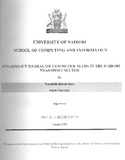| dc.description.abstract | This study covers issues (albeit in general terms) of Information Communication Technologies (JCT) as
could be related to the transport sector in areas of infrastructure planning, development and management,
public services, legal provisions, institutional and regulatory frameworks, safety and security, funding,
gender mainstreaming, and environmental considerations, among others for purposes of examining
possibilities of using it to improve socio-economic well-being of all stakeholders. The secondary aim of the
study is; to create an awareness which may lead to the promotion of effective interest by stake holders in
[CTs and possibly leading to the establishment of enabling frameworks to nurture the development of a safe,
efficient and affordable commuter transport system, whilst keeping a leading edge of technological
advancement in a rapidly changing local and global environment. The vision is to have a digitally driven and
smart transport sector in Nairobi that is optimally integrated and responsive to the needs of all Nairobians.
ICT, however, cannot bring about the stated benefits without proper, diligent, effective and efficient
collaborative all-inclusive systems. It would work in an environment well beyond its confines yet it can be a
link for harmony, growth, development, tranquillity and prosperity amongst and between multiplicities of
transport sub-sectors. Basic understanding of the environment in which the ICT is to be implemented is
essential and the author started with the survey of the wider Nairobi before getting into the case study for
illustration. He has also drawn conclusions from the study and pointed out the proposed way forward which
if implemented would contribute to the upholding of the integrity and dignity of most airobians.
The study report starts with the introduction stating the objectives, motivation, challenges, methods used and
project justification. Next, it deals with situation analysis of the area of study in which the author examined
the historical perspective, urban growth in Kenya in general, the role of local authorities in Development, the
legal-institutional and regulatory frameworks as related to the transport sector and common factors that
influence demand for transport.
The next section is the launch into the case study namely; the Nairobi commuter. Here the approach is
defined. Details showing the data collection instruments, that is, the commuter survey questionnaire,
discussion about the steps taken to implement the survey including establishment of sampling frame, data
collection and the processing of the same are covered.
Before dealing with the results of the survey, some observations were made in the course of the surveys
which have been detailed in the section that follows. The observations covered include: poor quality of
transport services, inappropriate transport modal split, unexploited Regional role of the existing transport
systems, lack of integration of the existing transport systems, environmental pollution, lack of vision and a
number of institutional deficiencies. | en |

